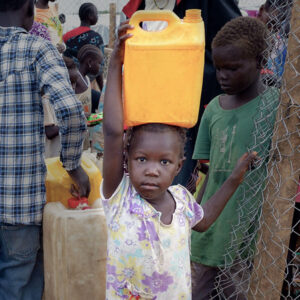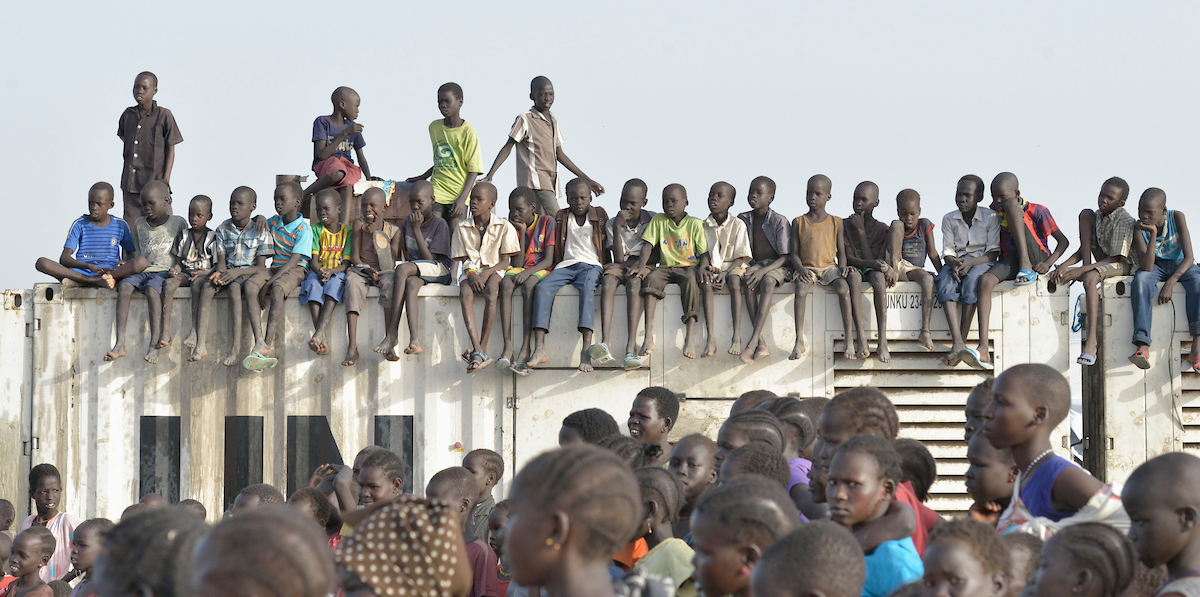
Tense Conditions in Malakal Refugee Camps Lead to Fighting, 13 Deaths
The Malakal refugee camp serving 50,000 in South Sudan’s Upper Nile State has hosted displaced people since the civil war in 2013. People fleeing violence, famine, and natural disasters flocked here for survival, and many remained since.
Now refugees are coming from the north to the already crowded camp to escape war in Sudan. The result is a tenuous mix of tribes and peoples, creating a hotbed of volatility in an already strained environment.
Last week a man died of stab wounds in a violent outbreak that led to the death of 13 people and injured 20 others. At least 3 were killed in the initial clash that erupted between rival ethnic groups. Later in the day, 10 more related deaths were confirmed.
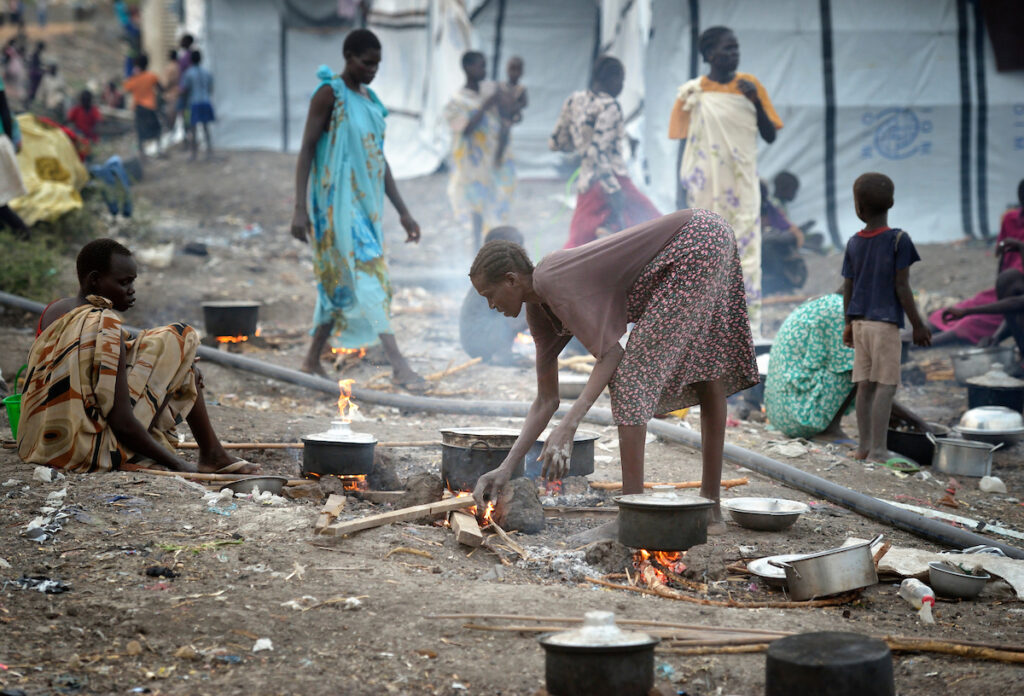
Approximately 3,000 people fleeing Sudan arrived at the Malakal camp in recent weeks, according to Upper Nile’s information minister, Luke Saadala. Ben Malor, a spokesperson for the UN Mission in South Sudan, said South Sudan’s army and the UN agency increased security around the camp following the incident, restoring order for the time being.
While the peace accord signed in 2018 led to a significant reduction in fighting, the region remains volatile with disputes over water rights, and use of grazing areas and farmland where resources are scant. The people of Malakal have also been victim to ongoing conflicts by armed militias.
UN agencies and humanitarian organizations continue striving to assist incoming refugees to the camp as Sudan’s war continues. With no good options before them, displaced families may simply be trading one life threatening scenario for a lesser one. Read more about this story here.
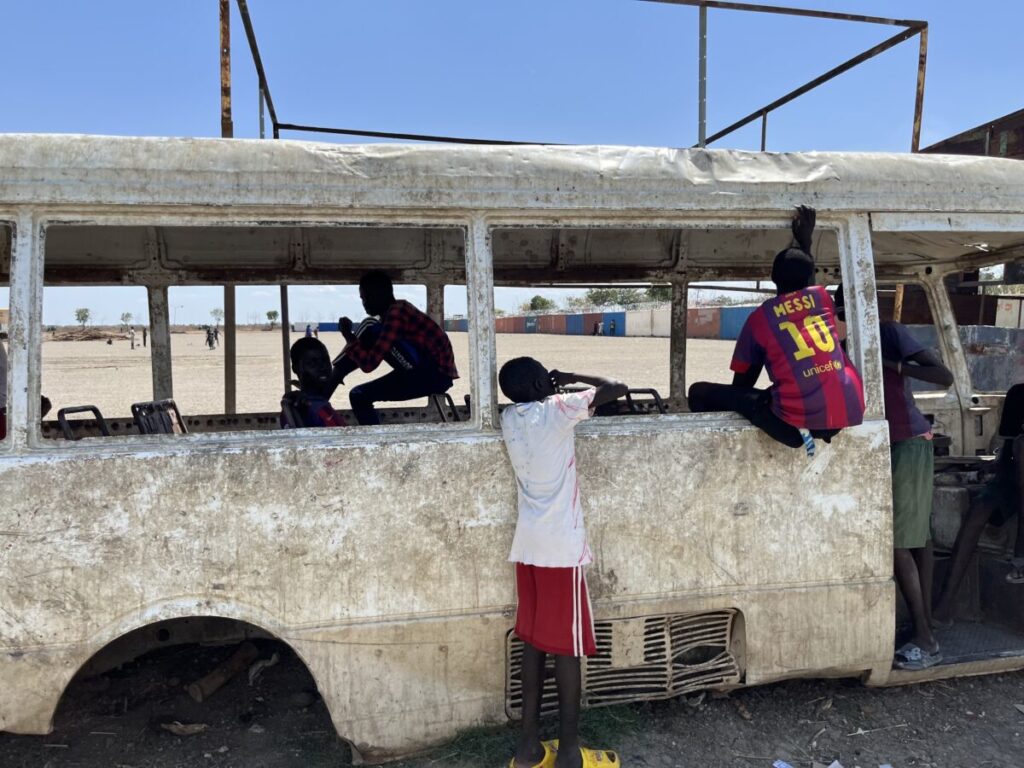
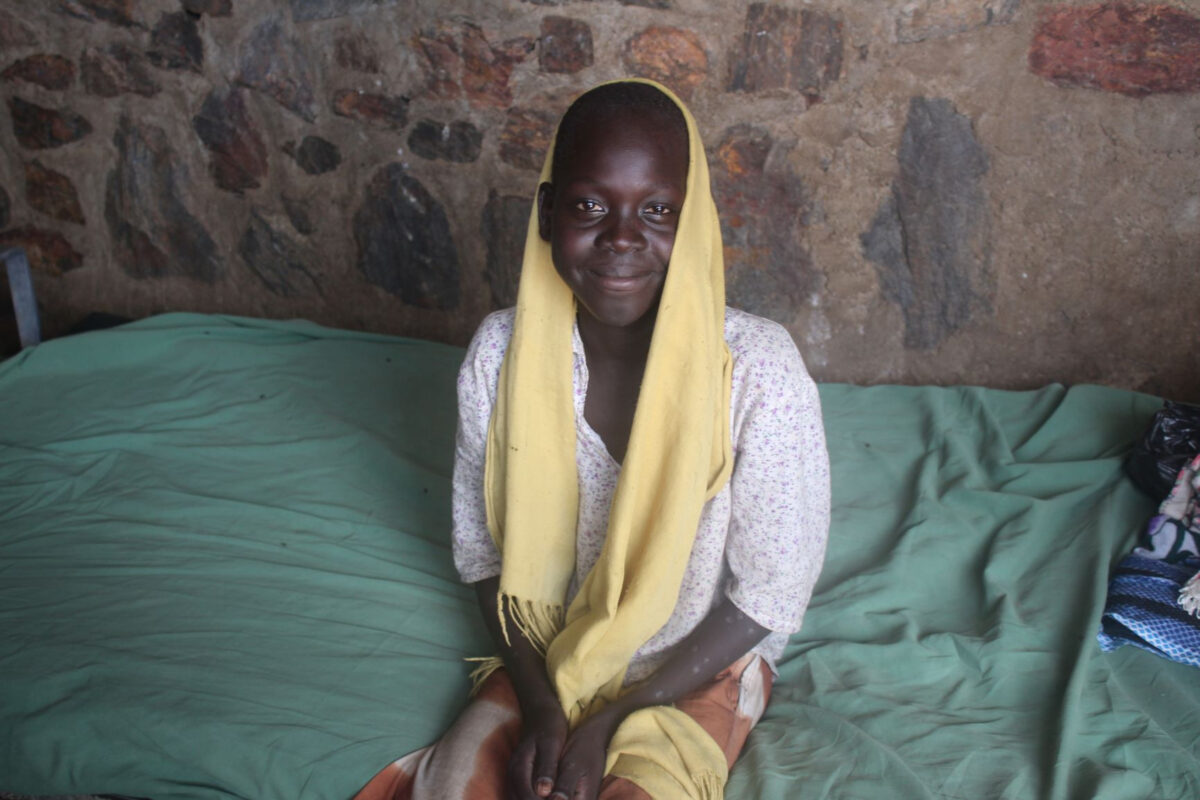
Suha
Teen Girl Unaware of Deadly Condition
Suha was just sixteen years old when she believed she had become pregnant. She was the second child from a large family in Tujor, Delami County. Suha presumed she was in her fourth month of pregnancy when things seemed to be going wrong.
Suha knew from the bleeding that recently started and didn’t go away there was a problem with her pregnancy. She went to the local hospital in Tujor, where she stayed for treatment and observation for ten days. But she received no definitive answers or solution. At that point, the hospital advised Suha to look for help at Mother of Mercy Hospital.
Set in the remote Nuba Mountains and directed for years by missionary doctor, Tom Catena, the hospital treats up to 500 patients daily and serves a population of more than 1.5 million people. Sudan Relief Fund continues to support this facility, the only one of its kind for hundreds of miles, offering critical medical care for many who come here as their last or only hope.
When Suha was admitted to Mother of Mercy Hospital, she soon learned the real reason behind her symptoms. She had a molar pregnancy – a false pregnancy where a non-cancerous tumor develops in the womb and grows. If not found in time, these tumors can cause permanent infertility. They can also turn cancerous and become deadly.
Suha was put on a treatment protocol of medicines that only Mother of Mercy Hospital has available in this region. She remained at the hospital for a stretch of four months to ensure her condition would be completely healed before leaving. Her recent tests all came back negative and showed no more indication of a life threatening condition.
Suha knows she was spared from a life of infertility and the threat of a deadly cancer. She also smiles as she says how she feels much better. Suha expressed her deep gratitude to the team at Mother of Mercy Hospital for saving her life. She also gave thanks for those who support the hospital, knowing it is what allows people like her and many others to receive the lifesaving care they would not be able to find anywhere else.
These stories are made possible by your support of Sudan Relief Fund. Thank you for partnering with us to save lives.
Would you like to pray for us? Sign up for our email prayer group to receive weekly emails sharing important needs to pray for. You’ll join a faith community around the globe praying to bring hope and help to suffering people in a forgotten part of the world. Click here to find out more.
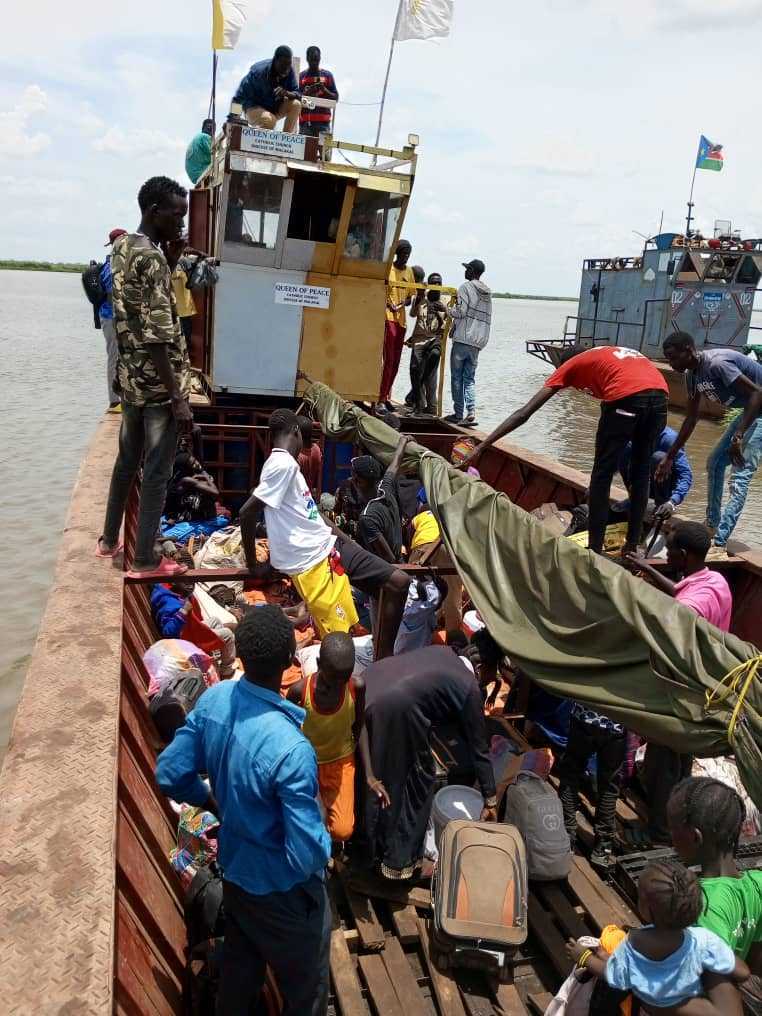
South Sudanese Refugees Flee Sudan, Face Challenges Returning Home
These were the lucky ones. They made it onto a boat and across the border into South Sudan, away from the violent fighting that broke out weeks ago in Sudan. Thousands of South Sudanese who fled war in their country years ago by migrating to the northern nation of Sudan, now find themselves fleeing Sudan’s war to return to their native country.
But despite the absence of immediate war in South Sudan, there is little here for them at the meager port town of Renk when they arrive. Thousands who were able to ferry here are now camping out in Renk with the few belongings they could carry with them.
There’s no humanitarian camp set up here. Refugees use sticks to hold up a sheet or blanket for shelter from the sun. They sit for hours and days. And they wait.
Many hope to get transportation down the waterway to the city of Malakal – where over 40,000 people already crowd into a displacement camp that hosts twice as many refugees as intended. Others have no funds to get transportation to the nation’s capital city of Juba or other parts of South Sudan where they hope to return.
There are no sanitation facilities for the thousands camped in Renk. No medical help or triage sites. Some who arrive are injured from escaping the violence in Sudan. One woman who was shot from stray gunfire and can no longer walk sits on the ground with a bullet still lodged in her lower back. That was three weeks ago.
Humanitarian organizations have set up the bare minimum of food and water provisions for the refugees in limbo here. But with little else and more returnees arriving daily, it is feared if the people aren’t moved onward soon, disease will break out.
Fighting among traumatized young men has already become a problem, with a skirmish around the water source escalating into 30 people injured and one killed. After that incident, many left the immediate area to camp along roadsides in Renk, where they have no access to food or water.
Aid organizations don’t want to set up a humanitarian camp in Renk. It is only seen as a transitional stop for returnees en route to other locations in the country. Instead the goal is to help refugees find means of transportation to their destinations, and provide support in their home areas.
“I’m concerned for our health,” says 50 year-old Awok Yak Wek, who was visiting her children in Khartoum before the fighting broke out. Ngong Malong Ngor, a 70 year-old elder from the same community as Awok, expressed his fears. “If we are not transported in the coming days, we are going to die here.” Read more here.
Keeping the Faith
Loreto Schools Continues Transforming Lives through Education, Remains out of Harm’s Way from Unrest in Sudan
Loreto Schools in Rumbek continues to make strides for education in a country where attendance has historically been among the worst in the world, and girls have widely been denied the chance to go to school.
The Loreto School for Girls is a pioneering force in girls’ education, and the Loreto campus also offers co-ed schooling at the kindergarten, primary, and secondary levels, consistently turning out some of the highest test scores in the nation. Principal, Sister Orla Treacy, directs the schools, along with a health clinic that serves both the campus and the surrounding community.
Vice Presidential Visit
Last month the girls of Loreto School had the opportunity to greet the nation’s Vice President, Hussein Abdulbaki, when they were invited to attend a reception held in honor of his visit to their state. The vice president spoke from Freedom Square where many political leaders and local people gathered to hear his message.
While political factions remain largely divided in South Sudan, many of its citizens long for unity and peace. On this theme, the elementary students at Loreto recently held a mock election, giving them a chance to learn about voting, democracy, and leadership. Sometimes change begins at the grassroots level, and Loreto Schools continues to be a force to promote peace and unity to its students, who come together from all tribes and regions of the country simply as “South Sudanese.”
Paying It Forward
Part of Loreto School’s lifechanging work is preparing young women to achieve higher education, and some go on to earn degrees at the university level. The school’s mission comes to fruition as graduates return to their home communities to share what they’ve learned, using their skills in service and leadership to others.
This month three young women who completed their university studies returned to Loreto to work in the health clinic on campus. The clinic not only serves the needs of students and staff, but also conducts vital outreach services to the community. The facility was instrumental during COVID when most of the country’s healthcare facilities shut down, remaining in operation to serve thousands. With their arrival, three of the five staff members who manage the clinic are now female alumnae from Loreto School for Girls, who completed college studies.
Staying Safe
Sister Orla reports that the students and staff are currently safe despite the fighting to the north in Sudan, although she expects they will begin to feel effects of the war soon. Please keep Loreto Schools in your prayers, along with the many affected by fallout from the ongoing violence that began several weeks ago in Sudan’s capital, and has since sparked waves of refugees fleeing to South Sudan.
Shadia
Mother Saved From Near Fatal Tragedy
Shadia leads a busy life as a mother taking care of a large family. In June of 2022, she was 36 years old and looking forward to welcoming another child. As a veteran mom, Shadia knew the pains she began experiencing when only six months’ pregnant were not a good sign.
Pregnancy and childbirth is still very risky for women in South Sudan, and where Shadia resides in the town of Siref is no exception. Very few mothers have access to prenatal care here, and many women still give birth in villages with no medical presence available.
After returning from the farm one day, Shadia felt such sharp abdominal pains in her sides that she went immediately to the nearest dispensary. She was given some pills to take, but they didn’t help and the pains persisted.
Shadia went to a private clinic in Heiban seeking help, where she was also given some medications. She took them for a week, but the pains still didn’t stop. Instead they were growing increasingly worse and becoming debilitating.
“I thought I would die and not see my kids again. But being here now and healthy, I can only praise God.”
At last, Shadia was taken to Mother of Mercy Hospital – a medical facility in the remote Nuba Mountains supported by Sudan Relief Fund. The hospital is an outpost of hope serving thousands in the region in need of medical help.
Missionary doctor and Sudan Relief Fund partner, Dr. Tom Catena, directs the hospital and has served as its only onsite surgeon for many years, both in peace time and war time. He is known locally as a legend among the people for saving so many lives.
By the time Shadia made it to Mother of Mercy Hospital, she was in very poor condition. She was in tremendous pain and struggling to breathe. An ultrasound revealed the baby in her womb was no longer viable, and the infant’s death was causing Shadia life threatening complications.
But Shadia was fortunate to have access to critical medical intervention that saved her life. Today she is alive and well, feeling grateful to have been treated in time at Mother of Mercy Hospital. “I don’t even know what to say or where to start. Seeing myself walk again when I, and the entire family – even the whole of my village – thought I would not survive, is a miracle in itself,” she praised. “I personally thought I would die and not see my kids again. But being here now and healthy, I can only praise God.”
Shadia continued, “I am grateful to Dr. Tom and the nurses for their care, and the donors who are supporting us here in Nuba. I am so happy I am alive and healthy. I pray God may give you all long life!”
These stories are made possible by your support of Sudan Relief Fund. Thank you for partnering with us to save lives.
Would you like to pray for us? Sign up for our email prayer group to receive weekly emails sharing important needs to pray for. You’ll join a faith community around the globe praying to bring hope and help to suffering people in this forgotten part of the world. Click here to find out more.
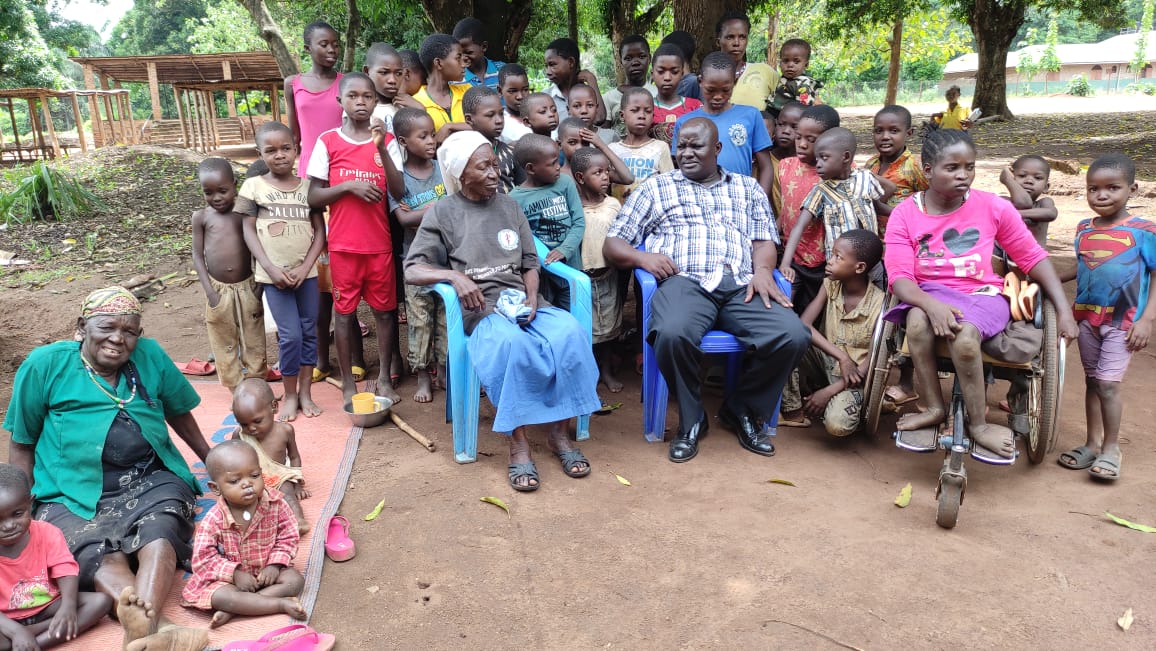
Food Deliveries, More Orphans, and a New Home on the Horizon
The children of Saint Bakhita Orphanage continue to be sustained by your compassionate support. Recently a generous food delivery was made to supply the needs of 70 children who depend on this care as their lifeline.
For those not familiar with Saint Bakhita, Sister Bianca Bii is the courageous matriarch of Saint Bakhita Orphanage, who steadfastly held the children together through a tumultuous year, supported by faithful sponsors and donors who stood with them throughout.
From fleeing violence near their orphanage, to surviving life in a refugee camp, and returning to their home only to have to flee once more, the unshakeable Sister now oversees the children’s care in their new, more stable location of Nzara.
Caring for More Orphans
Now even more children have come to Sister Bianca for help and care. She has raised generations of orphaned and abandoned children, and with your help, St. Bakhita Orphanage provides them with food, clothing, shelter, clean water, basic medicines, and the chance to go to school. Each one is loved and valued, and no one is turned away.
Imagine how comforting that sounds to a traumatized child who has just lost everything.
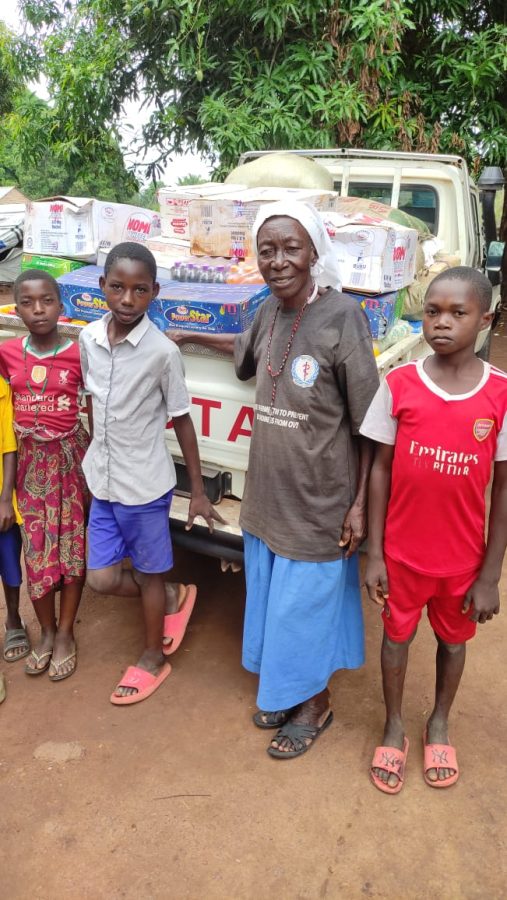
Recently, Sister Bianca took in 30 more orphans who came to her in Nzara. The group that now totals 100 children is temporarily living in tents – a necessary move when the orphans had to be relocated quickly to Nzara for their safety.
The tragedy of orphans in South Sudan is a crisis of epidemic proportion. War, internal violence, poverty, disease, famine – all these factors contribute to children suddenly facing life in a perilous world alone. The reality is, they can’t survive alone very long.
But Sudan Relief Fund is there to stand with Saint Bakhita Orphanage. Because of your support, we’ve been able to provide additional food at a critical time to meet the needs of more children.
A New Home on the Horizon
We’re also grateful to share that because of our steadfast supporters, a permanent housing solution for the children in Nzara is in the works! Our local partners identified a piece of land they believe will provide a successful location for the orphans’ future home, and plans for construction are underway.
On April 19, Sister Bianca joined Bishop Eduardo Kussala and others as a ceremonial groundbreaking event was held to bless the land and construction of the project. Sister Bianca expressed her joy at the groundbreaking of the plot, saying she is “grateful to the partners for the support of the construction, and that it will provide a safe and conducive environment to take care of the orphans.”
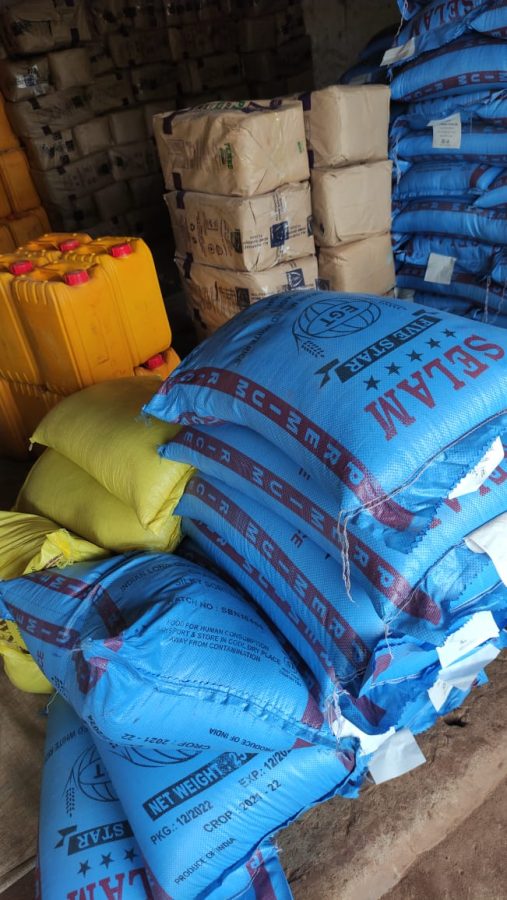
The building will contain two dormitories (one each for boys and girls), a kitchen, staff quarters, and a multi-purpose hall. Bishop Kussala praised that the new home for the orphans will “promote health, education, and children’s empowerment,” adding that helping an orphanage is like transforming the world.
That’s what our donors do – transform the world for children who have lost theirs. We’re immeasurably grateful to our donors who faithfully sponsor the orphanage with monthly support. And to everyone who has shared a compassionate gift for children who would be lost and alone without it.
Breaking News in Sudan
Many have followed the breaking news in the northern nation of Sudan. It’s feared the fighting in Khartoum could further disrupt food supply shipments and worsen the severe hunger crisis already facing South Sudan this year.
Another effect of the fighting is an influx of refugees from the north, heading or returning to South Sudan to escape the conflict. The struggling nation of South Sudan is reeling from deep humanitarian challenges of its own and scarcely equipped to accommodate mass numbers of refugees who are already arriving.
At present the volatile situation in Sudan has not affected the children of Saint Bakhita Orphanage, who remain in a safe location and are provided for at this time by the generosity of sponsors and donors.
We offer heartfelt gratitude once more for your critical role in sustaining the lives of so many orphaned children at Saint Bakhita. Your commitment allows the light of Saint Bakhita Orphanage to shine as a place of hope for heartbroken children who have nowhere left to go. If you would like to help Saint Bakhita’s orphans, please go here.
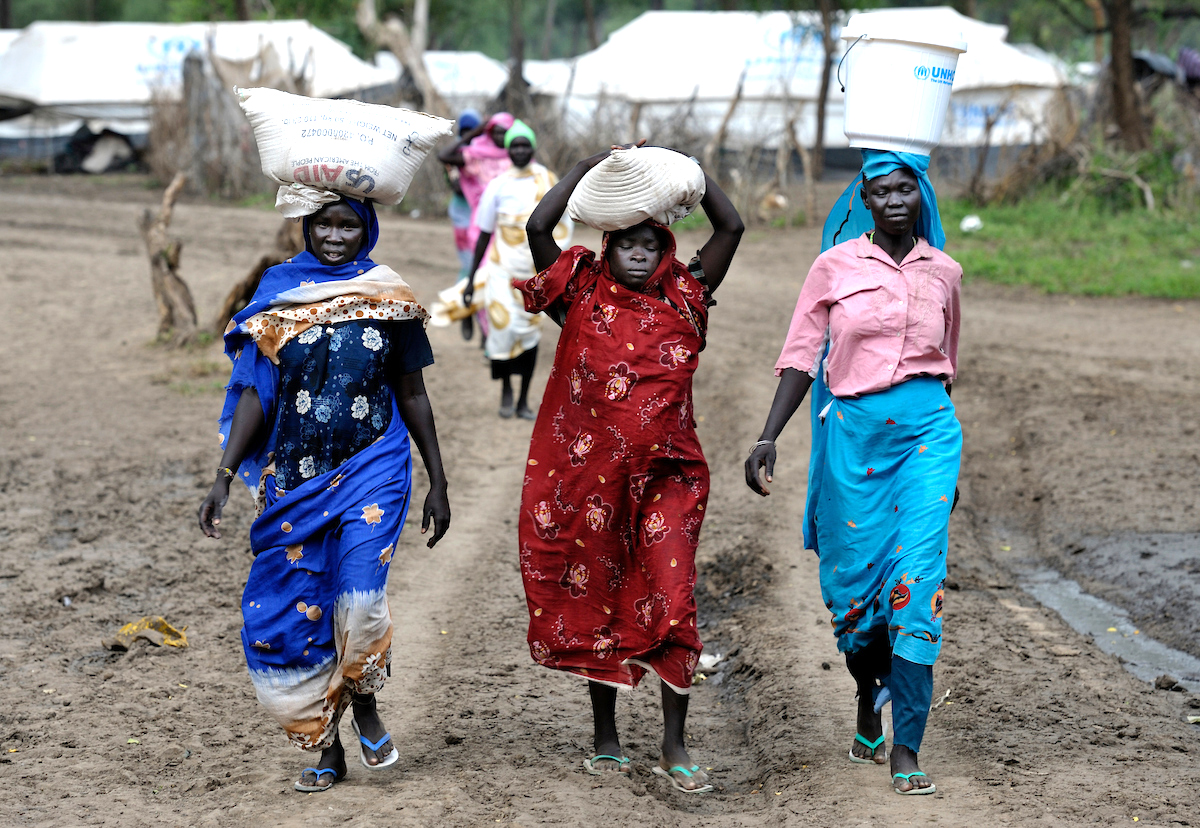
Sudan Update
Air strikes are battering the capital city of Khartoum, Sudan, breaking a three-day truce that was negotiated to allow civilians to flee the country after intense fighting.
The government says the strikes were a necessary move to counter actions of the rival military forces known as the Rapid Support Forces (RFS) in the city, where fighting began April 15.
Clashes erupted between forces behind rivaling generals, Abdel Fattah al-Burhan of the Sudanese government military, and Mohamed Hamdan Dagalo, known as Hemedti, over the future of RFS being incorporated into the national army.
Foreign governments moved quickly to evacuate their diplomats last week when the conflict erupted, though civilians have been caught in the crossfire and millions remain stranded in Sudan. Thousands of others have made their way to evacuation routes by air, land, or sea.
The official death count is listed at 500, including 2 US nationals, but the actual number is believed to be far greater.
Many South Sudanese living in the southern region of Sudan – having previously migrated there to escape violence in their own country – are now returning to South Sudan, or crossing borders into Chad or Egypt where they can fly into Juba, South Sudan’s capital city. Humanitarian efforts are already underway in South Sudan to prepare for the anticipated influx of refugees.
Mo Ibrahim, a Sudanese businessman and philanthropist, said his country is now embroiled in a civil war – one which must be kept from expanding to neighboring borders to prevent a regional crisis. “We don’t want another Syria,” he said. The worst fighting is presently concentrated in the north of Khartoum, near the convergence of the Blue and White Niles.
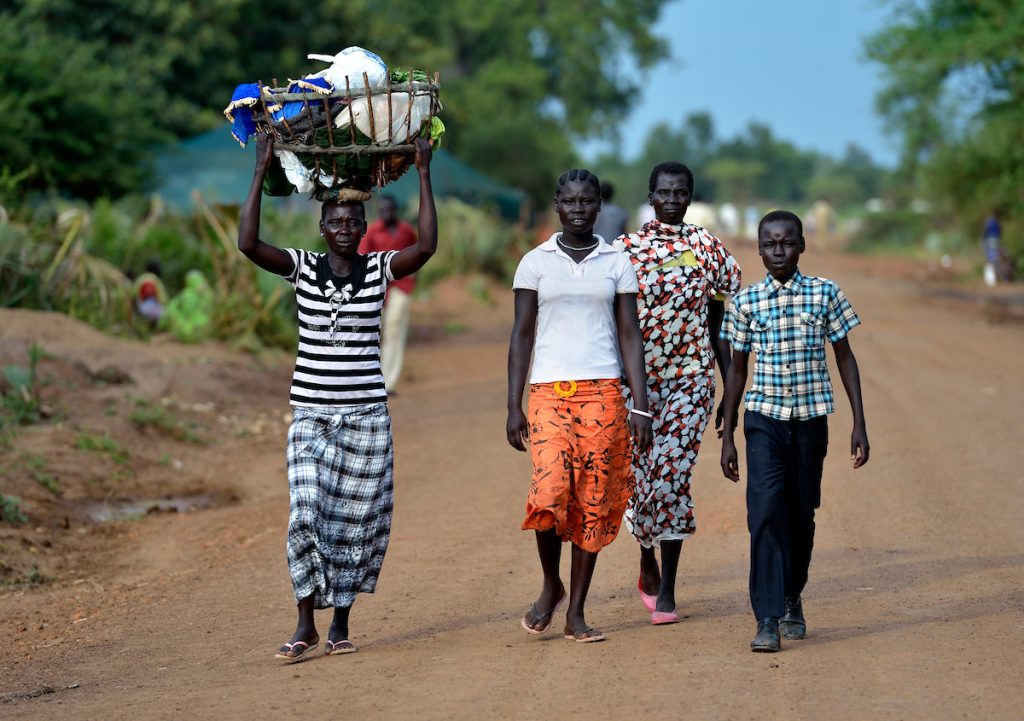
Trapped civilians bunkering at home in Khartoum struggle to hold out, while venturing outside for supplies has become risky. One civilian reported not having had a single drop of water at his home since fighting began April 15. Neighbors with wells in their home have been sharing water, he said.
The World Food Program announced Monday it would resume relief operations in Sudan. The aid organization pulled out two weeks ago following three staff member casualties that happened in the initial fighting.
The first flight bringing major medical relief has landed in the country, as over 70 percent of healthcare facilities were forced to close in Khartoum. The International Committee of the Red Cross (ICRC) reports a plane landed at Port Sudan carrying eight tons of relief supplies and health kits for hospitals. The ICRC is now seeking guarantee of safe passage to deliver those supplies into areas with active fighting.
Foreign governments continue rescue operations to evacuate nationals still caught in the fray. The FCDO (Foreign Office) advised civilians wishing to leave to make their way to the evacuation point in Port Sudan.
An organized US convoy has arrived in Port Sudan to evacuate more US citizens by ship to Saudi Arabia. According to Reuters, the Navy ship USNS Brunswick has reached the port. It is believed this ship will be used to bring stranded US citizens aboard to assist in rescue efforts.
There are hundreds of US citizens thought to remain stranded, with other reports saying the number could be as much as 16,000. The Biden administration claims most civilians still on the ground are dual citizens who’ve lived in Sudan for years and may wish to remain.
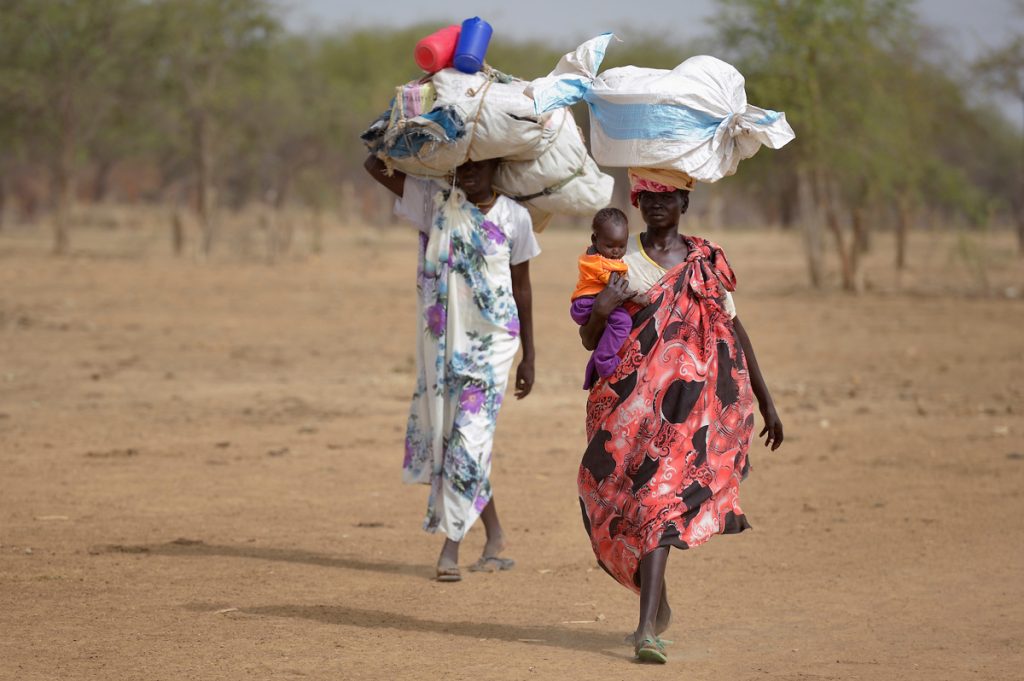
The Biden administration also reported buses carrying several hundred Americans reached Port Sudan, guarded by drones in the air. A Pentagon representative said the Department of Defense “deployed US intelligence, surveillance, and reconnaissance assets to support air and land evacuation routes.” Deputy Pentagon Press Secretary Sabrina Singh said the US was “moving naval assets within the region to provide any necessary support along the coast.”
Missionary doctor Tom Catena directs the Mother of Mercy Hospital in Sudan. The hospital is a Sudan Relief Fund supported facility that provides the only critical-level medical care available in the remote Nuba Mountain region.
Dr. Tom reported the hospital has not yet received patients affected by the conflict in Khartoum, which is removed by a distance equivalent to traveling from New York City to Atlanta. However, he said the cost of food and fuel has already doubled, and supply lines may be affected if the fighting escalates. Dr. Tom issued a plea for continued support during this tenuous time so the hospital can continue its lifesaving work.
Read more of the breaking news in Sudan and South Sudan here and here.
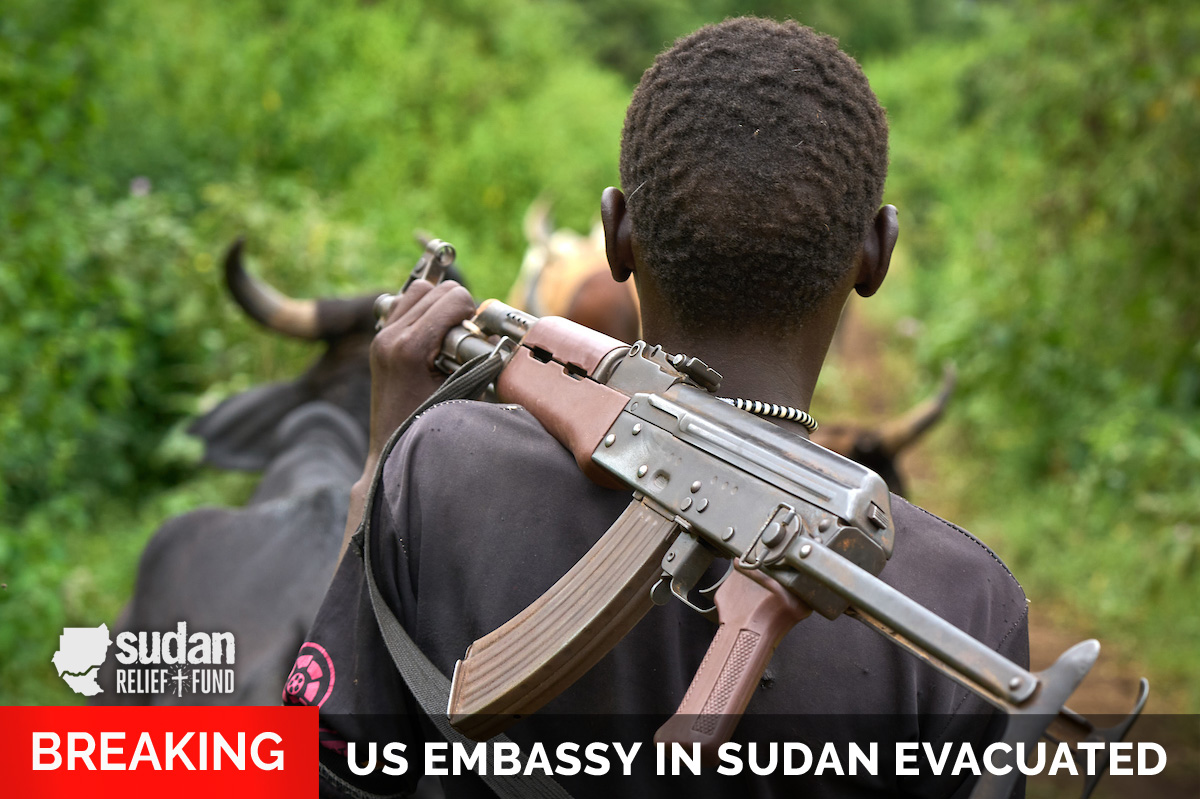
US Evacuates Embassy in Sudan as Fighting Escalates and Conditions on the Ground Deteriorate
Experts Fear Fighting Will Worsen Existing Hunger Crisis
The US and other foreign governments moved quickly this weekend to evacuate their embassies, as ten days of fighting that erupted between government forces and supporters of the previous Sudanese regime created perilous conditions in Sudan’s capital city of Khartoum and other parts of the nation.
A cease-fire that had been sought for a 3-day reprieve to allow local citizens to celebrate a Muslim holiday did not survive the intensity of the clashes between rival generals and their forces. While a number of foreign nations were successful in retrieving their diplomatic staff and employees, many foreign citizens, students, and locals desperate to escape the chaos remain stranded.
Efforts by citizens struggling to flee the country by air, on land by vehicle, or by boat at the Port of Sudan, were hampered by fighting that destroyed at least one runway at the airport and knocked out electricity and internet connections – further hindering communications for rescue and evacuation operations. Thousands of other civilians are bunkered in their homes, attempting to survive with no access to supplies or power.
*Read more about the crisis here

Fear of Famine Worsens
The fighting in Sudan is a humanitarian crisis, and the conflict will have a devastating impact far beyond just the capital of Khartoum.
Relief from world food programs was already cut back to neighboring South Sudan this year, with agencies citing impassable delivery routes and the war in Ukraine as cause for the reductions. With the outbreak of violence in the northern border nation of Sudan, many aid organizations are evacuating as well, leaving civilians left behind with little to no resources.
And with the region already facing a looming famine in the aftermath of consecutive record floods, the current violence and interruption of supply routes could propel the hunger crisis to catastrophic levels. The lethal combination of disastrous flooding, reduced aid, supply interruptions, and fallout from the collapse of order in Sudan’s capital, could put millions at risk of death by starvation.
Sudan Relief Fund is determined to stay with the people through this crisis. For 25 years we’ve remained committed to helping suffering people in Sudan and South Sudan through some of the worst conditions imaginable. We continue to provide essentials like clean water, food, shelter, and medical treatment when others leave. But through the years this has only been possible with your partnership.

Keeping Hospitals Open
Curtailed supplies not only affect food availability. Critical services like hospitals are also hit hard. Wartime is not new to missionary doctor, Tom Catena, and his staff at Mother of Mercy Hospital, who continue to provide the only place of lifesaving medical care in the entire Nuba Mountain region of Sudan.
Tom has served steadfastly through civil and national war, endured bombings, serious illness, isolation, and attempts on his life. He and others on the ground with Sudan Relief Fund are dedicated to remaining here through the turmoil in order to help people in desperate conditions.
What You Can Do
Won’t you please stand with us? Here’s how you can help:
- Donate to Sudan Relief Fund. We’ve been on the ground through times of peace and times of peril in this region, and are equipped through our partners to deliver help where it is needed most.
- Pray with us. Join our worldwide network of prayer partners, to pray for Sudan and South Sudan. You’ll receive news each week by email with a specific need or praise to pray about.
- Share. Please share news of this growing crisis with family, friends, co-workers, and your social media spheres. Together we can do so much to effect positive change and transform the trajectory of desperate people’s lives. Imagine if you were the one in need of help, and how much it would mean to you and your family. #PeaceforSudan
It is the innocent – children, families, pregnant mothers, elderly – who always suffer the most during times of warfare and catastrophe. Sudan Relief Fund has been trusted since 1998 to bring life-changing help and hope to people suffering in this forgotten part of the world. Please help us make a difference during this crisis. Your help is needed right now.
“Helping one of the most severe humanitarian crises today.”
-Ann T.
“Sudan Relief Fund is one of my top charities!”
-Robert M.

Donate Now
“Join me in donating to this most needed cause.”
-Larry B.
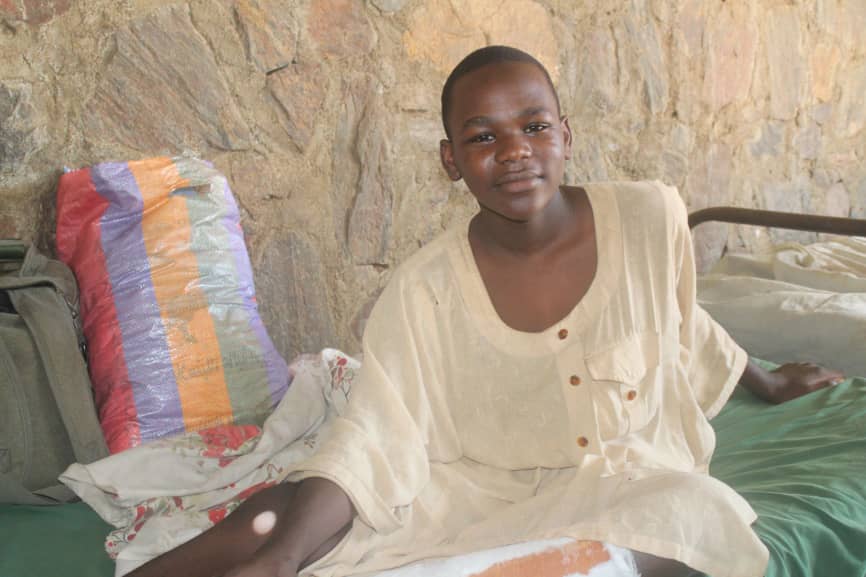
Abdu
When A Boy’s Broken Leg Turns Deadly
Boys will run and play and inevitably they sometimes break bones. Thirteen year-old Abdu Razak was doing just that when he fell down and fractured his leg.
His parents took Abdu to the El Obeid Hospital in Central Sudan, where he needed an operation to repair and set the bone. While the operation seemed to be successful, it became apparent after some time that Abdu’s leg was not healing as it should.
What no one realized yet was Abdu had contracted osteomyelitis, a serious condition where bacteria reaches and infects the bone. If not stopped, this condition can lead to the loss of a limb and life threatening complications.
Typically, strong antibiotics and surgery to remove all infected bone tissue are required to recover successfully. The victim experiences fever, swelling, fatigue, and pain at the site of the infection.
“Abdu’s father pulled his son on the back of a three-wheeled tuktuk for nearly 145 miles to reach the facility where he hoped his boy could find help.”
A few weeks after his injury, Abdu’s parents learned about Mother of Mercy Hospital from neighbors who spoke very highly of the facility. Despite the distance and the rugged, muddy terrain, Abdu’s father pulled his son on the back of a three-wheeled tuktuk for nearly 145 miles, to reach the facility where he hoped his boy could find the help he needed.
Abdu was admitted to Mother of Mercy Hospital, where he was diagnosed and treated for the condition that threatened his leg and life. He’s undergone two surgeries so far, and is improving greatly. His leg is saved, and happily, Abdu is expected to heal completely. He’s looking forward to getting back to school and resuming a normal teen life.
Both Abdu and his parents are exceedingly grateful to Mother of Mercy Hospital. His parents earnestly thank the staff and supporters of this hospital for saving their son from a far worse fate. Because of the right help at a critical moment, a thirteen year-old boy will soon run and play again, just as young boys should.
These stories are made possible because of your support for Sudan Relief Fund. Thank you for partnering with us to save lives like Abdu’s and so many others.
Would you like to pray for us? Sign up for our email prayer group to receive weekly emails sharing important needs to pray for. You’ll join a faith community around the globe praying to bring hope and help to suffering people in this forgotten part of the world. Click here to find out more.

